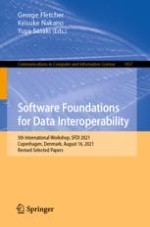2022 | Buch
Software Foundations for Data Interoperability
5th International Workshop, SFDI 2021, Copenhagen, Denmark, August 16, 2021, Revised Selected Papers
herausgegeben von: Dr. George Fletcher, Keisuke Nakano, Dr. Yuya Sasaki
Verlag: Springer International Publishing
Buchreihe : Communications in Computer and Information Science
